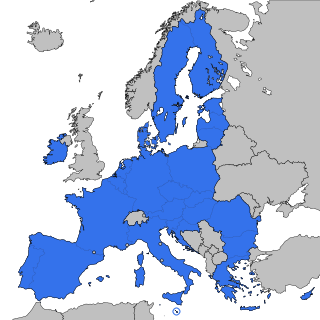Related Research Articles

Federalism is a mode of government that combines a general government with regional governments in a single political system, dividing the powers between the two. Johannes Althusius is considered the father of modern federalism along with Montesquieu. He notably exposed the bases of this political philosophy in Politica Methodice Digesta, Atque Exemplis Sacris et Profanis Illustrata (1603). Montesquieu sees in the Spirit of Laws, examples of federalist republics in corporate societies, the polis bringing together villages, and the cities themselves forming confederations. Federalism in the modern era was first adopted in the unions of states during the Old Swiss Confederacy.

The Federalist Party was a conservative and nationalist American political party and the first political party in the United States. Under Alexander Hamilton, it dominated the national government from 1789 to 1801. Defeated by the Democratic-Republican Party in 1800, it became a minority party while keeping its stronghold in New England and made a brief resurgence by opposing the War of 1812. It then collapsed with its last presidential candidate in 1816. Remnants lasted for a few years afterwards. The party appealed to businesses and to conservatives who favored banks, national over state government, manufacturing, an army and navy, and in world affairs preferred Great Britain and strongly opposed the French Revolution and Napoleonic wars. The party favored centralization, federalism, modernization, industrialization, and protectionism.
The term federalist describes several political beliefs around the world. It may also refer to the concept of parties, whose members or supporters called themselves Federalists.

There is ongoing discussion about the extent to which the European Union (EU) has already turned from a confederation into a federation over the course of decades, and more importantly, to what degree it should continue to evolve into a federalist direction. As of January 2024, the EU has no formal plans to become a federation.
World government is the concept of a single political authority with jurisdiction over all of Earth and humanity. It is conceived in a variety of forms, from tyrannical to democratic, which reflects its wide array of proponents and detractors.

A federation is a political entity characterized by a union of partially self-governing provinces, states, or other regions under a federal government (federalism). In a federation, the self-governing status of the component states, as well as the division of power between them and the central government, is constitutionally entrenched and may not be altered by a unilateral decision, neither by the component states nor the federal political body.
A confederation is a political union of sovereign states united for purposes of common action. Usually created by a treaty, confederations of states tend to be established for dealing with critical issues, such as defence, foreign relations, internal trade or currency, with the central government being required to provide support for all its members. Confederalism represents a main form of intergovernmentalism, defined as any form of interaction around states that takes place on the basis of sovereign independence or government.

Anti-Federalism was a late-18th-century political movement that opposed the creation of a stronger U.S. federal government and which later opposed the ratification of the 1787 Constitution. The previous constitution, called the Articles of Confederation and Perpetual Union, gave state governments more authority. Led by Patrick Henry of Virginia, Anti-Federalists worried, among other things, that the position of president, then a novelty, might evolve into a monarchy. Though the Constitution was ratified and supplanted the Articles of Confederation, Anti-Federalist influence helped lead to the passage of the Bill of Rights.

The Union of European Federalists (UEF) is a European non-governmental organisation, campaigning for a Federal Europe. It consists of 20 constituent organisations and it has been active at the European, national and local levels since 1946.

Altiero Spinelli was an Italian politician, political theorist and European federalist, referred to as one of the founding fathers of the European Union. A communist and militant anti-fascist in his youth, Spinelli spent 10 years imprisoned by the Italian fascist regime. Having grown disillusioned with Stalinism, he broke with the Communist Party of Italy in 1937. Interned in Ventotene during World War II, he, along with fellow democratic socialists, drafted the manifesto For a Free and United Europe in 1941, considered a precursor of the European integration process.
Anti-Federalist Papers is the collective name given to the works written by the Founding Fathers who were opposed to, or concerned with, the merits of the United States Constitution of 1787. Starting on 25 September 1787 and running through the early 1790s, these Anti-Federalists published a series of essays arguing against the ratification of the new Constitution. They argued against the implementation of a stronger federal government without protections on certain rights. The Anti-Federalist papers failed to halt the ratification of the Constitution but they succeeded in influencing the first assembly of the United States Congress to draft the Bill of Rights. These works were authored primarily by anonymous contributors using pseudonyms such as "Brutus" and the "Federal Farmer." Unlike the Federalists, the Anti-Federalists created their works as part of an unorganized group.

In the United States, federalism is the constitutional division of power between U.S. state governments and the federal government of the United States. Since the founding of the country, and particularly with the end of the American Civil War, power shifted away from the states and toward the national government. The progression of federalism includes dual, cooperative, and new federalism.

Federalist No. 6, titled "Concerning Dangers from Dissensions Between the States", is a political essay written by Alexander Hamilton and the sixth of The Federalist Papers. It was first published in the Independent Journal on November 14, 1787, under the pseudonym Publius, the name under which all The Federalist Papers were published. It is one of two essays by Hamilton advocating political union to prevent the states from going to war with one another. This argument is continued in Federalist No. 7.
The Ventotene Manifesto, officially entitled For a Free and United Europe. A Draft Manifesto, is a political statement written by Altiero Spinelli, Ernesto Rossi, and Eugenio Colorni, while they were imprisoned on the Italian islet Santo Stefano of the island of Ventotene during World War II. Completed in June 1941, the manifesto was circulated within the Italian Resistance, and it soon became the programme of the Movimento Federalista Europeo. It called for a socialist federation of Europe and the world. In the text, European federalism and world federalism are presented as a way to prevent future wars. Vayssière notes that the manifesto is widely seen as the birth of European federalism. Spinelli, who was later elected to the European Parliament within the Italian Communist Party lists, became a leader of the federalist movement due to his primary authorship of the Manifesto and his postwar advocacy. The manifesto called for a break with Europe's past to form a new political system through a restructuring of politics and extensive social reform. It was presented not as an ideal, but as the best option for Europe's postwar condition.
Cooperative federalism is a school of thought in the field of cooperative economics. Historically, its proponents have included J.T.W. Mitchell, Charles Gide, Paul Lambert, and Beatrice Webb.
Ronald William Gordon Mackay, known as Kim Mackay, was an Australian-born British Labour Party politician known for his European federalist views.

The Spinelli Group is an initiative founded with a view to reinvigorate the endeavour for federalisation of the European Union (EU), by creating a network of citizens, think tanks, NGOs, academics, writers and politicians who support the idea of a federal and united Europe. Among other goals, the Group aims to "find a federal majority [among members of the European Parliament] on important subjects." Founded on 15 September 2010 in the European Parliament (EP) in Brussels, the group is named after Altiero Spinelli (1907–1986), founder of the Union of European Federalists (UEF) and a founding father of the European integration.

The World Federalist Movement/Institute for Global Policy, Ltd. is an organization that advocates for a democratic world government of a world federalist system. They seek to realize these goals by expanding international organizations and moving towards a unified system of governance.
World federalism or global federalism is a political ideology advocating a democratic, federal world government. A world federation would have authority on issues of global reach, while the members of such a federation would retain authority over local and national issues. The overall sovereignty over the world population would largely reside in the federal government.
References
- ↑ Obituary:Sir Charles Kimber Daily Telegraph, 22 April 2008. Retrieved 20 January 2013.
- 1 2 3 Peter Barberis, John McHugh, Mike Tyldesley, Encyclopedia of British and Irish Political Organizations: Parties, Groups and Movements of the 20th Century, Continuum International Publishing Group, 2000, ISBN 0826458149. (p.135)
- ↑ Michael Burgess, The British Tradition of Federalism. Fairleigh Dickinson Univ Press, 1995. ISBN 0838636187 (p.142)